Amazon, Google, HP, Microsoft and Rackspace cloud storage test results
Nasuni, which offers off-the-shelf data storage infrastructure solutions in the form of services, has prepared a regular test report on cloud data warehouses, which are offered on the market by the largest vendors of Amazon, Google, HP, Microsoft and Rackspace.
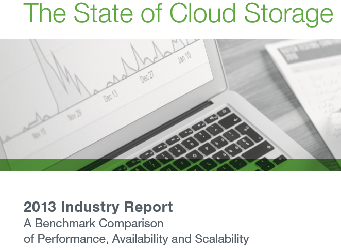
Among others, the following tests were carried out: for writing speed, reading and deleting data, responsiveness of services, uptime, scalability, and the number of errors when reading / writing data.
For those who do not like to read and understand the figures, a brief summary of the report:
')
Testing methodologists can be studied in detail in the presented report , below are the results and comments from the report.
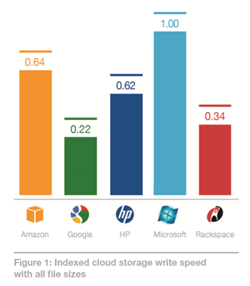
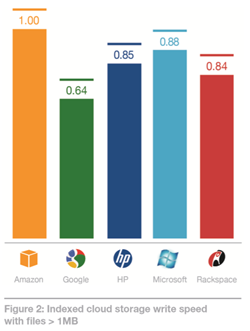
Microsoft showed the best results in tests for the speed of writing data (of any type) to the cloud storage, overtaking competitors in 14 of 23 individual tests. In the second and third place with a large lag of the cloud from Amazon and HP.
In tests for writing files larger than 1 MB, the results of testing of all vendors are close to each other, since the impact of storage transactions decreases dramatically with increasing file size. In this type of test, Amazon won the cloud, Microsoft came second with a slight lag, and cloud from HP and Rackspace ranked third with almost identical results.
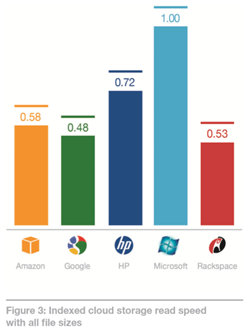

The test results of reading data (both in general and with files of size> 1MB) from cloud storage also show the speed advantage of the Microsoft platform.
In the case of testing the reading of any files with a sufficiently large lag in second place, Amazon follows, followed by the rest of the vendors with approximately the same results.
The test results for reading files larger than one megabyte are somewhat different, with Microsoft lagging behind, followed by HP, Amazon and Rackspace. In third place is the Google cloud.
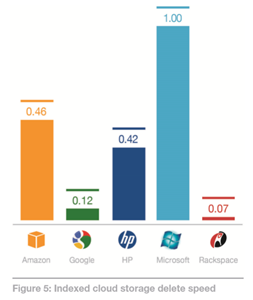
The results of testing the speed of deleting files again demonstrate a significant advantage of the cloud from Microsoft. Amazon is in second place with a large backlog, HP is in third place. Clouds Google and Rackspace show a significant lag in the speed of data deletion. The report states separately that the file size does not affect the test results.
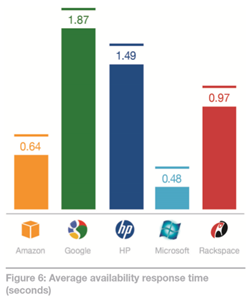
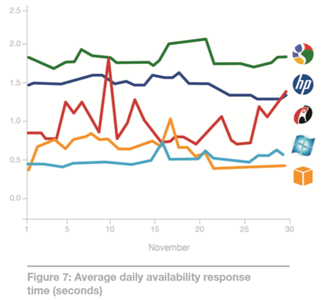
Testing the responsiveness of cloud services was measured at the rate of response time to requests for read / write / delete operations over a period of 30 days.
The Microsoft service showed the best results with an average responsiveness of 0.48 seconds. With a slight lag in the results, Amazon is in second place. Further, the remaining cloud vendors are far behind. At the same time, as noted in the report, the cloud from Rackspace showed the most unpredictable behavior during the testing period.
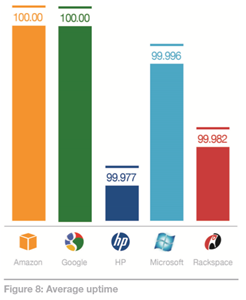
During testing, the level of availability or uptime of cloud services was also measured. Amazon and Google demonstrated 100% availability during the testing period. Microsoft cloud showed uptime - 99.996% and other providers showed uptime below 99.99%.
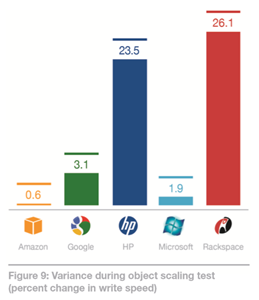
The scalability of services was tested as follows: 100 million new objects were loaded into the cloud storage, and no more than 30 days were given for this operation. The numbers of the test results show how much the download speed has changed over time, which reflects how much the service performance depends on the number of loaded objects, that is, how much the service scales without loss of performance.
Testing showed excellent scalability of Amazon, Microsoft and Google cloud storages, the performance of which is not affected by the number of loaded objects. Clouds from HP and Rackspace (which are built on OpenStack) showed the worst scaling results when loading a large number of objects into the cloud.
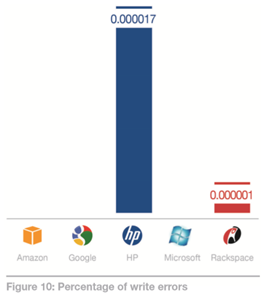
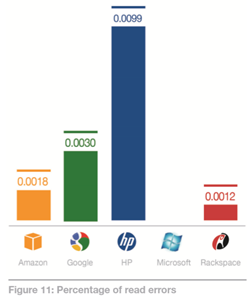
During performance testing of cloud storage, service access errors were separately tracked. When testing a record of 100 million objects, Amazon, Google, and Microsoft showed no errors at all. Errors when writing data were from vendors HP 0.000017% and Rackspace 0.000001%.
When testing data reading, only the Microsoft cloud showed no errors. The rest of the vendors somehow failed the test and showed different levels of read operation errors.
The following is a literal translation of the final findings from the report:

Among others, the following tests were carried out: for writing speed, reading and deleting data, responsiveness of services, uptime, scalability, and the number of errors when reading / writing data.
For those who do not like to read and understand the figures, a brief summary of the report:
')
This year, our tests revealed that Microsoft Azure Blob Storage took a significant step forward, overtaking the previous leader Amazon S3. For all three major tests (performance, scalability, stability) Microsoft showed the best results in each category. Even taking into account the fact that Azure is represented on the market not so long ago as S3 and does not have such volumes of stored data, it is clear that Microsoft’s investment in the platform is beginning to pay dividends and that the technology they offer to the market is the best.
Testing methodologists can be studied in detail in the presented report , below are the results and comments from the report.
Data writing speed


Microsoft showed the best results in tests for the speed of writing data (of any type) to the cloud storage, overtaking competitors in 14 of 23 individual tests. In the second and third place with a large lag of the cloud from Amazon and HP.
In tests for writing files larger than 1 MB, the results of testing of all vendors are close to each other, since the impact of storage transactions decreases dramatically with increasing file size. In this type of test, Amazon won the cloud, Microsoft came second with a slight lag, and cloud from HP and Rackspace ranked third with almost identical results.
Data reading speed


The test results of reading data (both in general and with files of size> 1MB) from cloud storage also show the speed advantage of the Microsoft platform.
In the case of testing the reading of any files with a sufficiently large lag in second place, Amazon follows, followed by the rest of the vendors with approximately the same results.
The test results for reading files larger than one megabyte are somewhat different, with Microsoft lagging behind, followed by HP, Amazon and Rackspace. In third place is the Google cloud.
Data deletion rate

The results of testing the speed of deleting files again demonstrate a significant advantage of the cloud from Microsoft. Amazon is in second place with a large backlog, HP is in third place. Clouds Google and Rackspace show a significant lag in the speed of data deletion. The report states separately that the file size does not affect the test results.
Responsiveness of services


Testing the responsiveness of cloud services was measured at the rate of response time to requests for read / write / delete operations over a period of 30 days.
The Microsoft service showed the best results with an average responsiveness of 0.48 seconds. With a slight lag in the results, Amazon is in second place. Further, the remaining cloud vendors are far behind. At the same time, as noted in the report, the cloud from Rackspace showed the most unpredictable behavior during the testing period.
Uptime services

During testing, the level of availability or uptime of cloud services was also measured. Amazon and Google demonstrated 100% availability during the testing period. Microsoft cloud showed uptime - 99.996% and other providers showed uptime below 99.99%.
Scalable Services

The scalability of services was tested as follows: 100 million new objects were loaded into the cloud storage, and no more than 30 days were given for this operation. The numbers of the test results show how much the download speed has changed over time, which reflects how much the service performance depends on the number of loaded objects, that is, how much the service scales without loss of performance.
Testing showed excellent scalability of Amazon, Microsoft and Google cloud storages, the performance of which is not affected by the number of loaded objects. Clouds from HP and Rackspace (which are built on OpenStack) showed the worst scaling results when loading a large number of objects into the cloud.
Errors read, write data


During performance testing of cloud storage, service access errors were separately tracked. When testing a record of 100 million objects, Amazon, Google, and Microsoft showed no errors at all. Errors when writing data were from vendors HP 0.000017% and Rackspace 0.000001%.
When testing data reading, only the Microsoft cloud showed no errors. The rest of the vendors somehow failed the test and showed different levels of read operation errors.
Conclusion
The following is a literal translation of the final findings from the report:
Microsoft confidently overtook other vendors in the test results, offering the best read / write / delete data among different data sizes, the highest responsiveness and the lowest error rate. Microsoft has not only significantly surpassed competitors in pure performance tests, but is also the only cloud platform with zero error rates during the test for 100 million read and write operations. In those categories where Microsoft is not in the first place (uptime and spread of scalability), the vendor is in second place close to the leader.
For these reasons, Microsoft has overtaken Amazon and won a place in the 2013 report. Cloud storage is a fast-growing market in which new offers and new suppliers constantly appear. The results of this testing illustrate that there is no parity among the products on the market yet. Although offering a “cloudy repository” is relatively easy, the desire to offer a high-performance, reliable and scalable solution requires significant focus, advanced technology and constant investment. Despite the fact that Microsoft won first place this year, it is quite possible that things may change again next year. For two years, until this report is published, the market leader has been constantly changing. As you can see from the results of this report, Amazon remains a strong player in the market and is well placed to further improve its platform and get better results.
Additionally, HP is a relative newcomer to cloud storage vendors who have shown strong performance results in read and write tests, which, when making improvements in stability, can make the company a key player in the market.
At Nasuni, we keep our promise to monitor, test and report changes in this dynamic market, looking closely at those who are today the leader and who are focused on offering the best complete cloud storage solution for our customers.
Source: https://habr.com/ru/post/221453/
All Articles